MXA RACE TEST: THE REAL TEST OF THE 2023 HONDA CRF450
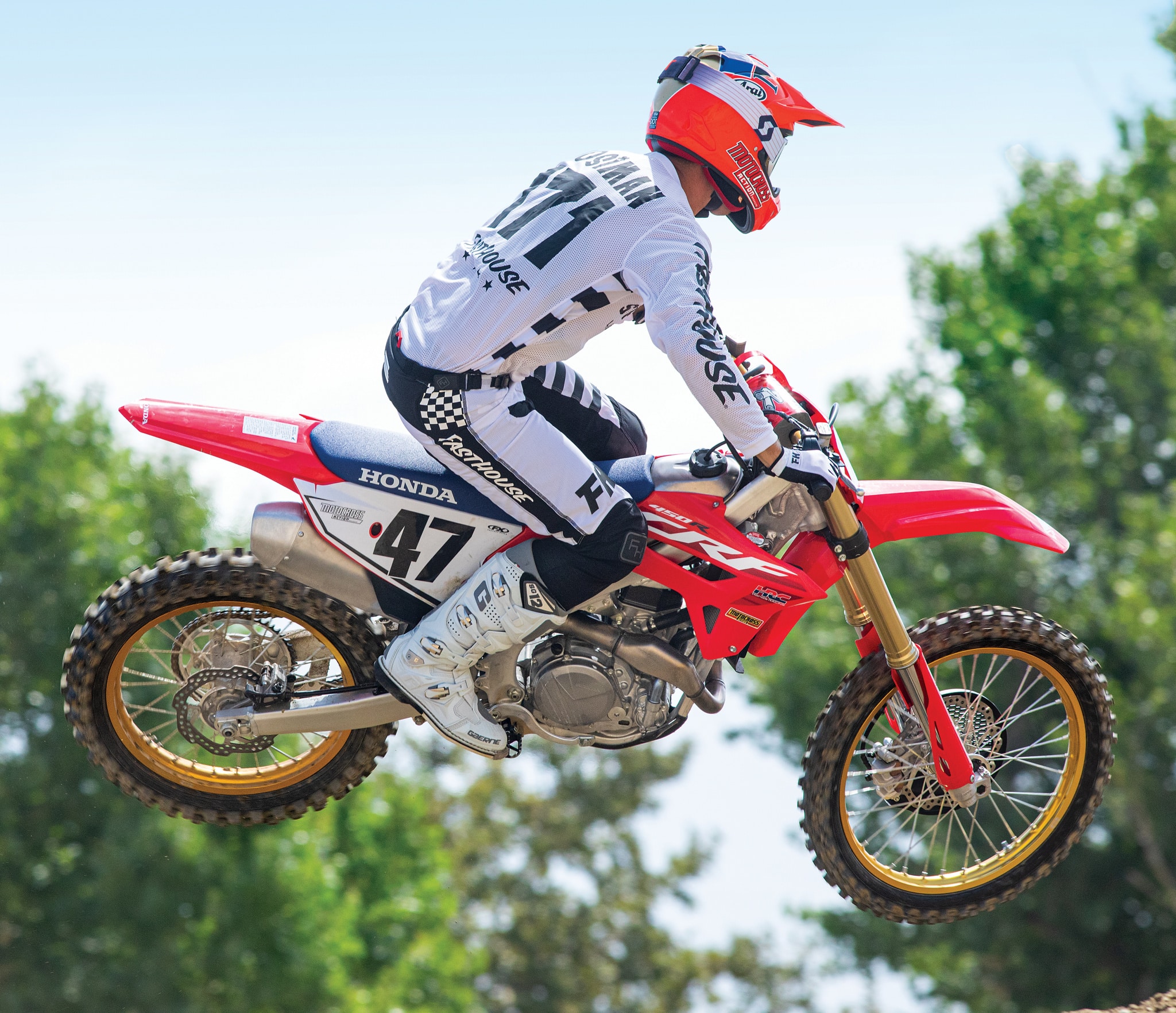 THE GEAR: Jersey: Fasthouse Originals A/C, Pants: Fasthouse Elrod A/C, Helmet: Arai VF-X Pro4, Goggles: Scott Prospect,Boots: Gaerne SG12.
THE GEAR: Jersey: Fasthouse Originals A/C, Pants: Fasthouse Elrod A/C, Helmet: Arai VF-X Pro4, Goggles: Scott Prospect,Boots: Gaerne SG12.
Q: FIRST AND FOREMOST, IS THE 2023 CRF450 BETTER THAN THE 2022 CRF450?
A: Yes, largely because the 2022 CRF450 was just a slightly revised 2021 CRF450—and those revisions, specific to mapping and fork valving, should have been caught in 2021 pre-production testing. But, due to the pandemic, there was very limited pre-production testing in 2021 or 2022. This was bad news for people who bought these two model years, but good news for potential buyers of the 2023 Honda CRF450, because Honda had two years to think about what they should have done.
Does this mean that the 2023 Honda CRF450 is night-and-day better than the 2022 model? Yes and No. “Yes” on the new powerband and “no” on the chassis and suspension setup. Keep reading, because we will go into detail on the good and the bad.
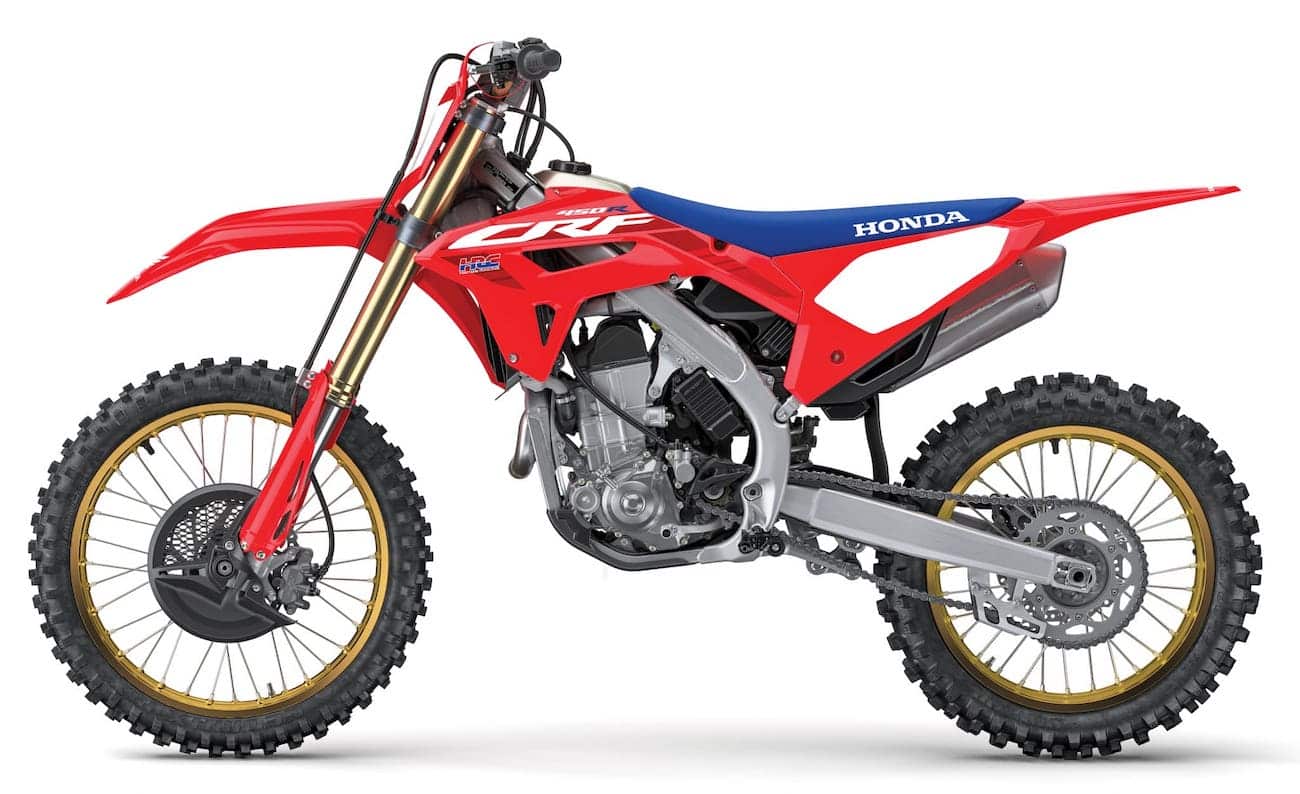
Q: WHAT ARE THE DIFFERENCES BETWEEN A 50TH ANNIVERSARY CRF450, A WORKS EDITION CRF450 AND A STOCK HONDA CRF450?
A: First, it is important to note, but not from a technical standpoint, that MXA is testing the 2023 Honda CRF450 50th Anniversary Edition. Obviously, with so many “editions” floating around the showroom floors, it is easy to be confused about what that means. In Honda’s case, they have four CRF450 models. Here is a breakdown for clarification.
2023 Honda CRF450: This is the base model of the four-bike lineup and is the go-to model that will dominate the floor space in Honda dealerships across the country. It gets all the touted 2023 engine, frame and suspension changes (listed below). It retails for $9599.
2023 Honda CRF450 50th Anniversary Edition. Technology-wise , Honda’s 50th Anniversary bike is no different from a showroom stock 2023 Honda CRF450 when it comes to the engine, frame and suspension. It is just a stocker spiffed up with gold rims, a blue seat, gold handlebars, gray triple clamps and special graphics commemorating Honda’s 50 years of selling CR motocross bikes. It retails for $9899, which is $300 more than the $9599 stocker.
2023 CRF450 Works Edition. The 2023 CRF450 Works Edition starts life as a stock Honda CRF450 but gets an extensive list of premium upgrades, including a stainless-steel Yoshimura exhaust, hand-polished exhaust port; Hinson clutch basket and cover; Throttle Jockey seat cover; D.I.D DirtStar LT-X rims; coated fork tubes, fork legs and shock; plus an 18mm shock shaft and gray triple clamps. It retails for $12,399, which is $2800 more than the $9599 stocker.
2023 CRF450-S. The CRF450-S is a 2022 CRF450 offered at a reduced price that provides a more affordable entry into high-tech Honda 450cc machinery. It does not get the latest 2023 CRF450 engine, frame or suspension mods, but it was the high-end showroom stock CRF450 just a few months ago. It retails for $8799, which is $800 less than the $9599 stocker.
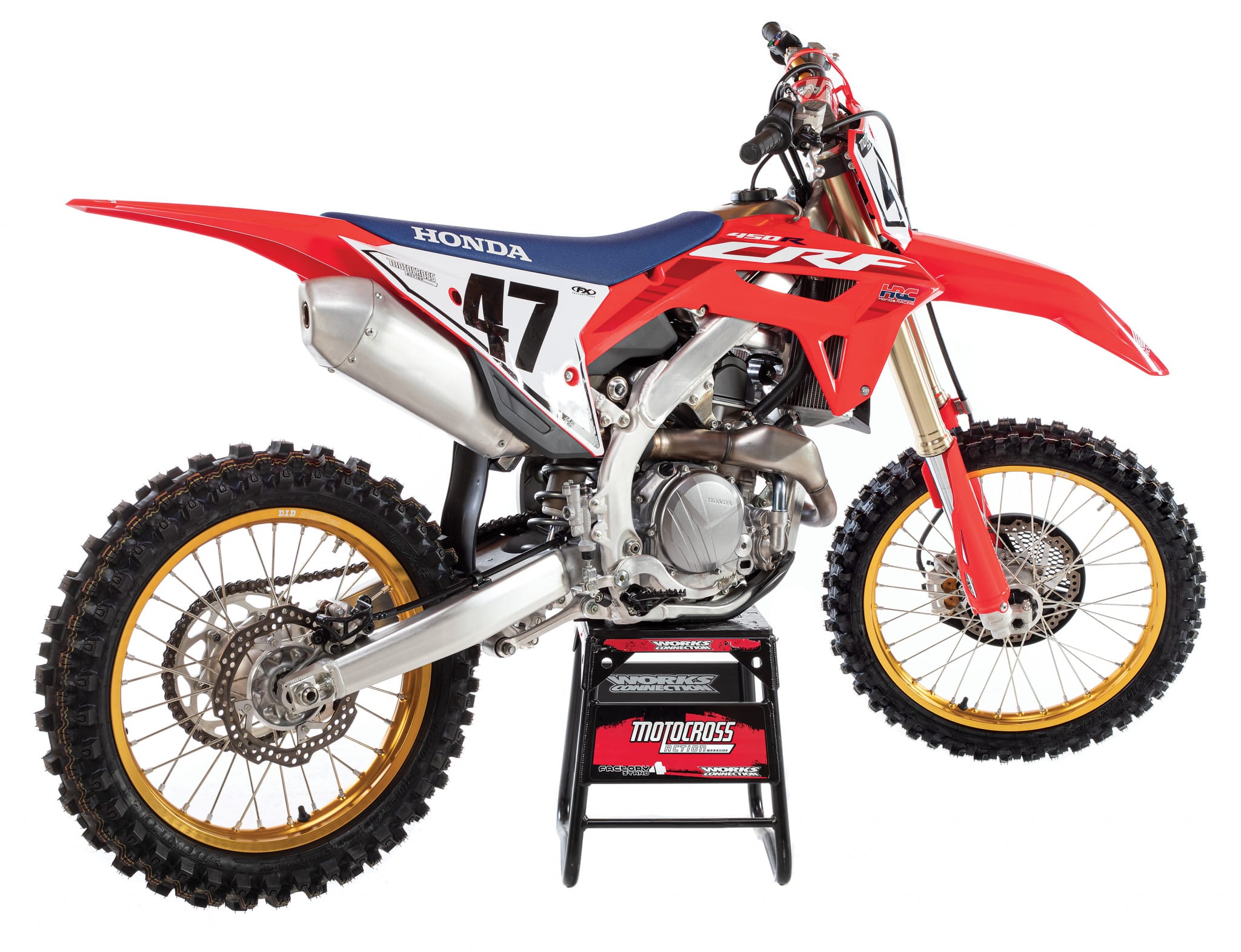 The 2023 Honda CRF450 50th Anniversary bike stands out with its blue seat cover and gold accents.
The 2023 Honda CRF450 50th Anniversary bike stands out with its blue seat cover and gold accents.
Q: WHAT DID HONDA CHANGE ON THE CRF450 FOR 2023?
A: The Honda engineers focused their 2023 R&D efforts on three areas—the frame, suspension and engine (with varying degrees of success).
Frame. No matter how closely you look at Honda’s 2023 Delta-box aluminum frame, you won’t see any visible changes. They are there, but they are centered in only two areas and hidden in plain sight. The forged bridge strut that connects the frame’s down tube to the extruded rectangular tubes of the frame cradle has been made 2mm thicker (from 4mm to 6mm), while the shock tower forging, where it connects to the top of the shock, is also 2mm thicker. These two forgings add strength to the frame in their specific bailiwicks, but they don’t add much to overall frame stiffness laterally or torsionally. And, getting a good feel for what their contributions were was made impossible by the unbalanced stock suspension settings.
Shock. The 2022 CRF450 shock was too soft throughout its stroke. It wallowed in the small-to-medium bumps and G’ed out in dips and jump landings. The quick 2022 fix was to up the shock spring from a 54 N/mm spring to a 56 N/mm spring. For 2023, the shock comes on the showroom floor with the stiffer 56 N/mm spring, which would seem like a positive step, but every MXA test rider felt that the rear shock overpowered the forks. And, when we tried to fix one end, it created issues at the other end. It is a plus once you find a balance between the two ends.
Fork. The 2023 Showa forks are a mystery. The fix is obvious to every previous CRF450 owner because the major issue in 2022 was that the fork was too soft in the first half of the stroke and too rigid in the second half; however, Showa missed the target of making stiffer forks that offered progressive damping throughout the stroke. The recommended compression setting on the 2023 Showa forks is 10 out on compression, but at 10 out the forks bottomed with fast test riders aboard, forcing them to go to 6 out, then to 4 out and finally 2 out. They were too soft for Intermediate and Pro test riders, but Vet and Novice riders could find a compression number that delivered full travel without the clank. Getting the front to work with the rear and the combined effort of both ends to work with the frame was the same old story—finding the proper balance is the key to success, but it is only possible on a smooth racetrack.
Engine. Once we read the specs on the 2023 engine, we didn’t need Sherlock Holmes to decipher Honda’s 2023 CRF450 engine code. What were the clues?
(1) The intake port’s shape was narrower and smaller. Honda would not tell us how much narrower; instead, they said, “Take the engine apart and measure it yourself. You guys are good at that.” But, we didn’t need to pull the head; we know what happens when you downsize the intake tubes.
(2) For 2023. Honda’s cam got a revised lobe profile to increase torque. This is more important on the intake valves than on the exhaust side. Lobes with a short duration but relatively high valve lift can provide better throttle response and improved torque to broaden powerband responsiveness.
(3) Honda lengthened the air boot that connects the throttle body to the airbox, but since there is an finite amount of room available between the throttle body and the front wall of the airbox, Honda’s engineers added length inside the airbox in the form of a longer trumpet (i.e. velocity stack). By using Bernoulli’s Effect in the air-boot design, air velocity was increased.
(4) The Keihin throttle body’s venturi diameter was reduced from 46mm to 44mm. This brings the Honda throttle body into line with the 44mm throttle bodies of KTM, Kawasaki, Yamaha, Suzuki, Husqvarna and GasGas. Honda had selected the larger 46mm throttle body because it flowed more air at high rpm, but they were giving up midrange at lower throttle settings
(5) There were a few miscellaneous changes: The head stays were changed from aluminum to steel, while the muffler perf-core was changed from round perforations to hot-rod-style hood louver perforations. The new drivetrain goals required mapping changes on the ECU. Additionally, the muffler’s aluminum body was made of a special heat-treated aluminum alloy to cut down on noise emission.
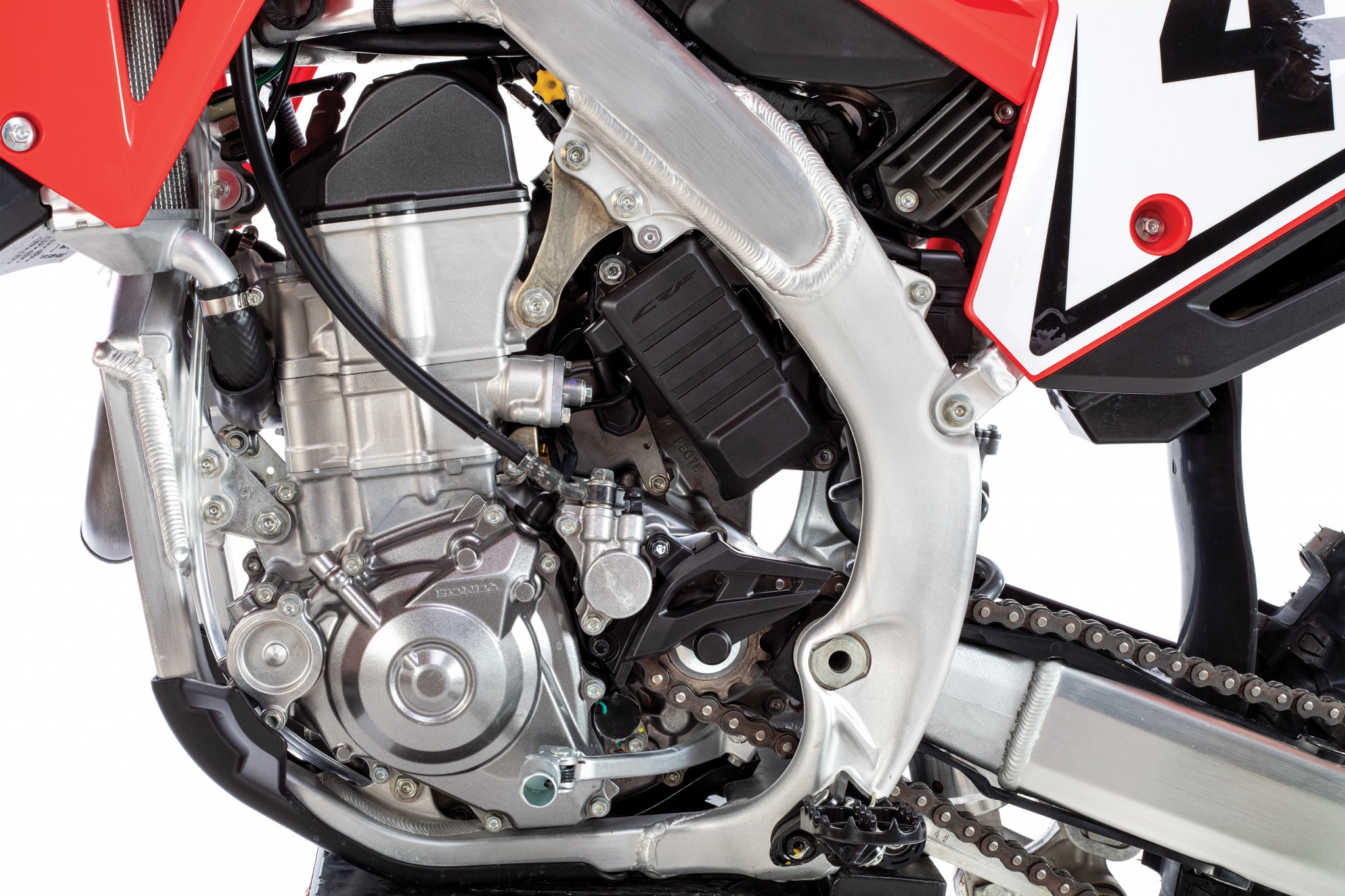 The 2023 Honda CRF450 engine updates produce game-changing power that focuses less on maximum horsepower and more on a torquey low-to-mid powerband.
The 2023 Honda CRF450 engine updates produce game-changing power that focuses less on maximum horsepower and more on a torquey low-to-mid powerband.
Q: HOW FAST IS THE 2023 HONDA CRF450?
A: There was no doubt from the get-go that Honda’s 2023 engine modifications were aimed at producing a milder, gentler style of power. Every change that Honda made to the 2023 engine reduced the volume of air pumped through the throttle body, down into the intake ports and processed via the new valve timing.
Every test rider who rode or raced the 2023 CRF450 raved about how easy the power was to use. At low rpm, the throttle worked like a rheostat. The rider could dial in exactly how much power he wanted. No more hyper-60-horsepower craziness. The ultra-linear powerband was, in a word, awesome; however, there was a price to pay for all of Honda’s detuning. The 2023 Honda CRF450 wasn’t instantly powerful, it was mellower everywhere and required the rider, who was no longer scared of its abrupt power, to make it go fast. It was a motocross racer’s engine instead of a top fuel drag racer’s engine.
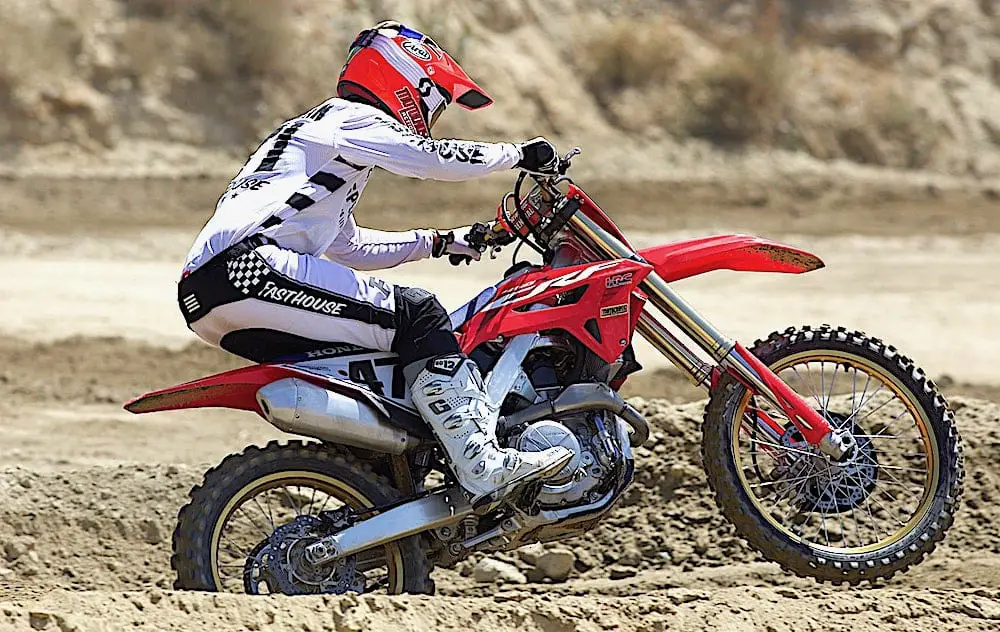
Q: HOW DID IT RUN ON THE DYNO?
A: We knew exactly what the 2023 Honda CRF450 would do on the dyno after racing it to break the engine in. And, our seat-of-the-pants dyno was accurate. From 4500 rpm to 7000 rpm, the 2023 engine was stronger than the 2022 engine and significantly stronger than the CRF450 Works Edition. From 7000 rpm to 8200 rpm, there was a virtual dead heat between the three Honda powerplants (2022, 2023 and Works Edition). After 8300 rpm, the Works Edition package took off like a scalded cat, gapping the 2022 engine by 3 horsepower and the 2023 engine by an amazing 4 horsepower. At its peak, the 2022 Honda CRF450 Works Edition pumped out 60.01 horsepower at 9600 rpm, the 2022 CRF450 engine hit 58.20 horsepower at 9300 rpm, while the 2023 CRF450 topped out at 56.3 horsepower at 9100 rpm.
You would think we would be disappointed in the 2023 powerband, but not only did it do what Honda’s engineers designed it to do, it also did what the MXA wrecking crew asked for in our 2022 CRF450 test. We wrote, “In MXA’s opinion, Honda’s absolute worst traits exhibit themselves when the CRF450 is pushed by a rider above 80 percent of its capabilities. If you stay below 80 percent, the Honda chassis is gentlemanly in its manners. It is only at speed that the combination of an overly rigid frame, unequal suspension settings and the frame’s harmonic imbalance make the Honda difficult to ride. The best CRF450 riders can make the CRF450 look like magic, but they tend to be smooth, precise and talented riders who choose to let the CRF450 flow by depending on consistent speed to make the bike work; think Ken Roczen.”
We like the 2023 powerband, because the throttle is more connected with the rear wheel. It takes out the hyper-sonic rpm and quasar horsepower of the previous engines and allows even the most maladroit CRF450 rider to get 80 percent out of the engine without having to give it 100 percent of his concentration.
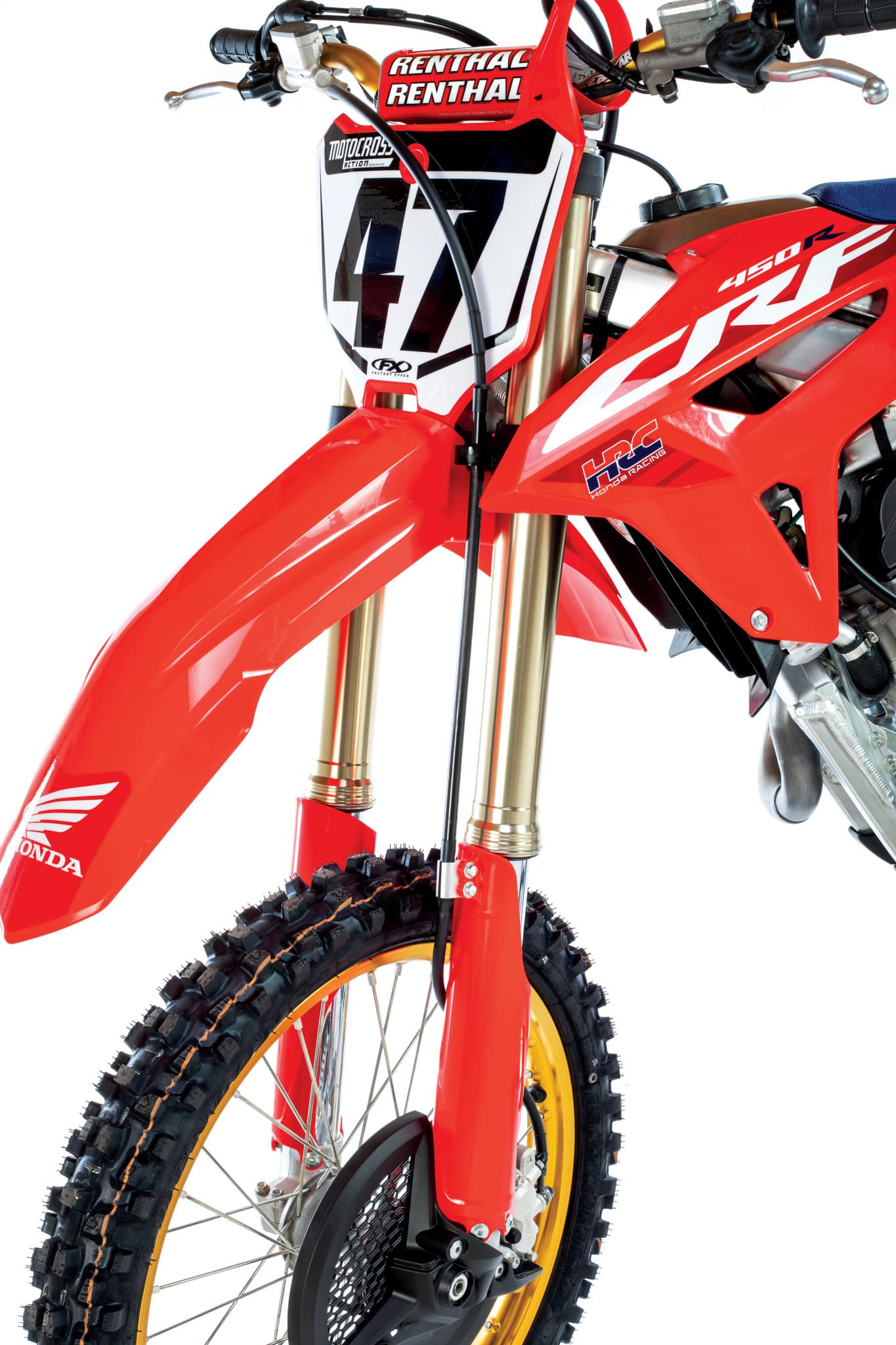 The 2023 49mm Showa coil-spring forks are too soft for fast racers and run out of available compression clicks in short order. Slower riders will find more comfort.
The 2023 49mm Showa coil-spring forks are too soft for fast racers and run out of available compression clicks in short order. Slower riders will find more comfort.
Q: HOW DOES THE 2023 HONDA CRF450 HANDLE?
A: If you’ve spent any time racing a modern CRF450, you already know the answer to the question. We hoped that a couple millimeters of aluminum below the head tube and above the shock body would lessen the CRF450’s tendency to twitch when you least expect it. It didn’t. Just like before, the 2023 CRF450’s best handling trait is at turn-in. Every MXA test rider was dumbstruck by how effortlessly the 2023 CRF450 attacked tight inside lines; however, the counterpoint to the Honda’s incredible turn-in prowess was that it felt very loose on corner exit. This is the time-honored good cop/bad cop effect of frame geometries that favor turning prowess over stability. They step out when the side thrust of tight cornering is released. When you add in Honda’s 30-year tendency to head-shake, going back to the Jeremy McGrath days, you have a bike that works best on smooth dirt or Supercross-style layouts.
We do think that the 2023 Honda CRF450 has the intrinsic capability to handle better than either the 2021 or 2022 models once the fore/aft balance issues are addressed.
Q: WHAT IS THE BEST MAP SETTING?
A: The CRF450 offers three different map settings (standard, mellow and aggressive). Here is the rundown:
(1) Standard map (one flash). Every MXA test rider preferred to run the Standard map in most situations. It offered the broadest spread of power and was the most usable. On the dyno, the standard map produced the most horsepower across the complete range (the same holds true for torque). It wasn’t night-and-day stronger at every rpm, but it was significantly better than the mellow or aggressive maps above 7000 rpm. Peak power in the Standard map was 56.88 horsepower.
(2) Mellow map (two flashes). The Mellow map is just as advertised. It delivers a no-rush style of power that would probably suit slippery surfaces or timid riders very well. On the dyno, the mellow map peaked at 55.97 horsepower.
(3) Aggressive map (three flashes). The Aggressive map is certainly more exciting off the crack of the throttle, has more of a hit down low and feels faster overall, but that is an illusion. Surprisingly, the Aggressive map produced less horsepower from top to bottom than the Standard map and didn’t have the breadth of the standard map. Worst of all, it detonated when pushed hard, albeit on a hot day with Pro test riders aboard. The quick fix was a race gas/pump gas mix, but more ECU fuel might be needed if you modify anything on the engine. On the dyno, the Aggressive map peaked at 56.24 horsepower.
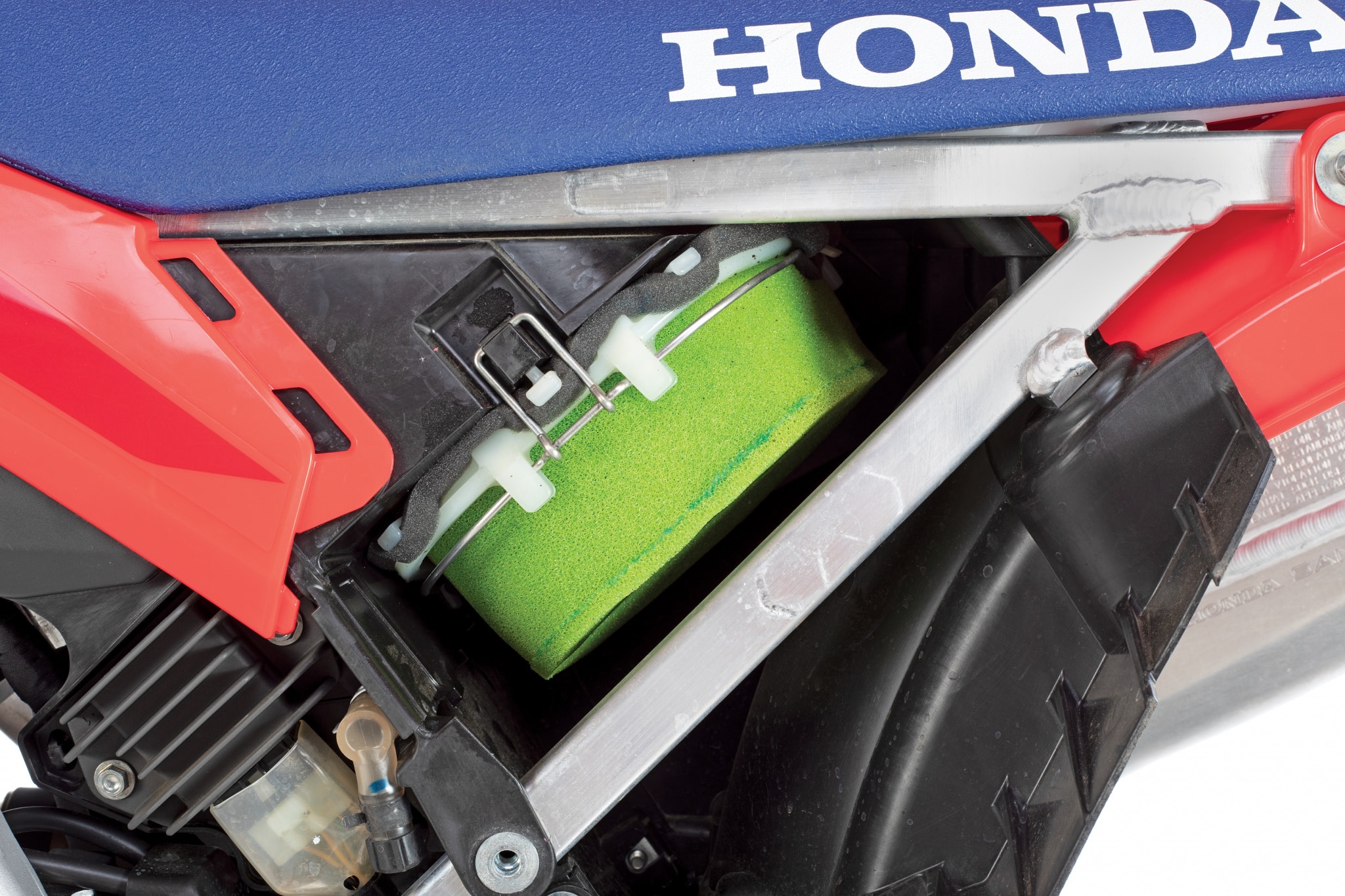 The CRF450 air filter is a creative design in that the intake tract goes up and over the shock; however, the air filter gets dirty very fast.
The CRF450 air filter is a creative design in that the intake tract goes up and over the shock; however, the air filter gets dirty very fast.
Q: WHAT DID WE HATE?
A: The hate list:
(1) Radiators. We boiled water in the radiator. Always check the water after every long moto. Switch to a high-pressure radiator cap.
(2) Exhaust flange. The studs backed out of the head when removing the exhaust system. We threaded them back in with Loctite.
(3) Shift lever. The CRF450 shift lever is 17mm shorter than a KTM shift lever. It was much harder to get your boot under in high-stress situations.
(4) Electronics. An incredible number of Honda riders have no idea how the map lights work, which light is which for traction control, or how to engage the launch control map. There are three settings available for every function. We gave each test rider a crib sheet to help him navigate the options.
(5) Air filter. From a design point of view, we love the concept behind Honda’s upside-down air filter, but in day-to-day life, it gets dirty very quickly.
(6) Balance. We got dizzy trying to find a good fore and aft balance. A change to the front ruins the rear and vice versa.
(7) Pinging. The new mapping was crisper and cleaner than in the past, but it pinged in the Aggressive map. Probably not a big concern in cool weather with a Vet in the saddle, but keep an ear out anyway.
Q: WHAT DID WE LIKE?
A: The like list:
(1) Powerband. Loved it! Loved it! Loved it! This is the usable Honda powerband that we have been waiting for since the awesome 2008 CRF450 was dropped in favor of a bunch of Honda CRF450 science projects.
(2) Ergonomics. The rider triangle, bodywork and saddle are perfect for every body type, from endomorphs to ectomorphs.
(3) Maps. Last year the difference between the CRF450’s three map choices was like splitting hairs. For 2023 the maps offered viable options for every powerband choice. We preferred the standard map (one flash) for most situations.
(4) Gearing. Choosing the correct gear ratio is dependent on track layout and rider skill level. The stock 13/49 gearing is in the ballpark, but some test riders preferred 13/50.
(5) 50th Anniversary. For $300 more, you get a better-looking CRF that harks back to the days of Ricky Johnson and David Bailey. There is one caveat: it just looks different. The performance is the same as the stocker.
(6) Launch control. Unlike most launch-control systems that retard the ignition to keep the engine from making max power when launch control is engaged, Honda uses a simple rev limiter to help bikes get hooked up off the line. Mode 1 limits rpm to 9500 rpm for starts that have good traction. Mode 2 limits rpm to 8500 rpm for starts that have adequate traction. Mode 3 limits rpm to 8250 rpm for slippery conditions or Novice riders.
(7) Traction control. Honda’s ECU monitors runaway revs and responds to them by retarding the ignition to stop wheelspin. Mode 1 interacts later and lighter. Mode 2 responds quicker with more intervention. Mode 3 cuts power instantly for slippery or muddy terrain.
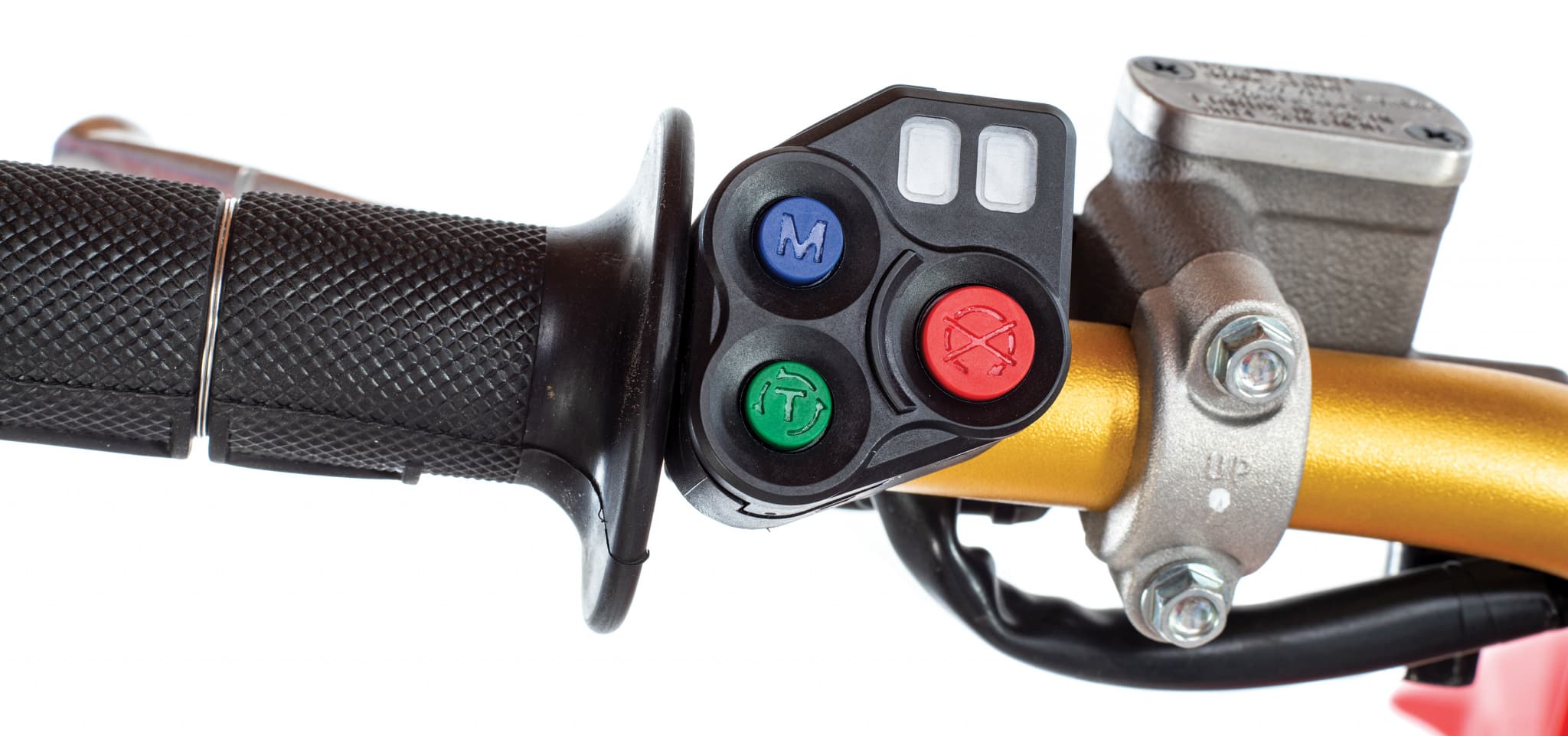 You can change maps, add traction control and kill the engine with this electronic suite.
You can change maps, add traction control and kill the engine with this electronic suite.
Q: WHAT DO WE REALLY THINK?
A: Although we had long-standing issues with some aspects of the 2023 Honda CRF450’s setup that every Honda owner will recognize in the handling and suspension, we truly believe that this is a better CRF450 than the last three years. The swing votes in favor of the 2023 model were a massive “yay” for the all-new power profile, the flawless ergonomics and the solid running gear.
MXA’S 2023 HONDA CRF450 SETUP SPECS
This is how we set up our 2023 Honda CRF450 for racing. We offer it as a guide to help you find your own sweet spot.
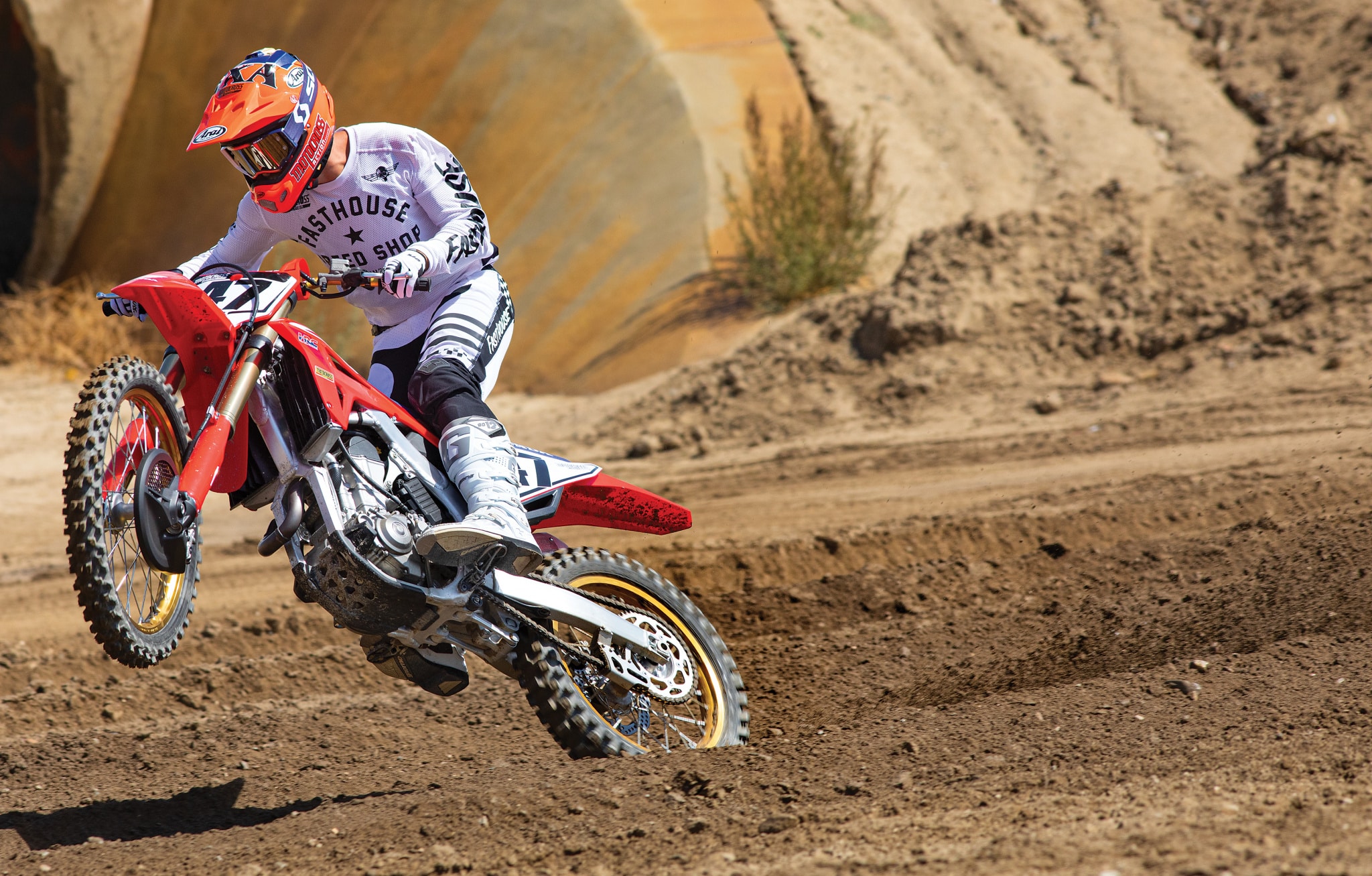
SHOWA COIL SPRING FORK SETTINGS
Our advice may seem strange, but forget all you know about modern bike setup on the 2023 Honda CRF450. Tried-and-true setup specs just make things worse on the CRF450. Take race sag as an example. Modern wisdom is to run the rear suspension with 105mm of race sag. This is great on a KTM, Kawasaki, Suzuki or Yamaha, but it aggravates the CRF450’s frame geometry; go to 100mm or 108mm, but stay away from 105mm. Whatever you do, don’t slide the forks up in the triple clamps to make it turn better; it already turns too well. If anything, slide them down in the clamps to stop the head shake. For hardcore racing, these are MXA’s recommended 2023 CRF450 fork settings (stock settings are in parentheses):
Spring rate: 5.0 N/mm
Compression: 10 clicks (stock), 2 clicks out (Pro), 6 clicks out (Intermediate), 10 clicks out (Vet)
Rebound: 20 clicks out (15 clicks out)
Fork-leg height: Flush with the fork caps.
Notes: The first thing to do with the CRF450 forks is to put a zip-tie on the right fork leg to monitor how much fork travel you are getting. Pray that you have some space between the zip-tie and bottoming, because then you can use the compression clicker to control the travel. The best fix for this is a re-valve.
SHOWA SHOCK SETTINGS
The stock 56 N/mm shock spring is what we ran last year. It was a big improvement over 2022’s stock 54 N/mm spring. So, why doesn’t this year’s stock 56 N/mm shock feel as good as it did last year? We ran less low-speed compression, less high-speed compression and increased the rebound (to help manage the recoil effect of the stiffer shock spring). For hardcore racing, these are MXA’s recommended 2023 CRF450 shock settings:
Spring rate: 56 N/mm
Race sag: 100mm
Lo-compression: 12 clicks out (6 clicks out)
Hi-compression: 1-5/8 turns out (2 turns out)
Rebound: 8 clicks out (13 clicks out)
Notes: Honda CR450s are all about front/rear balance. For 2023, the shock overrides the front forks, so the first place to start looking for balance is up front.




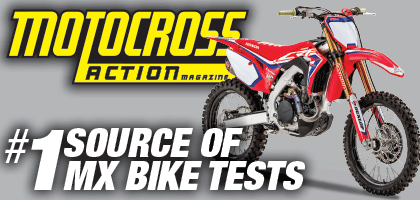


Comments are closed.